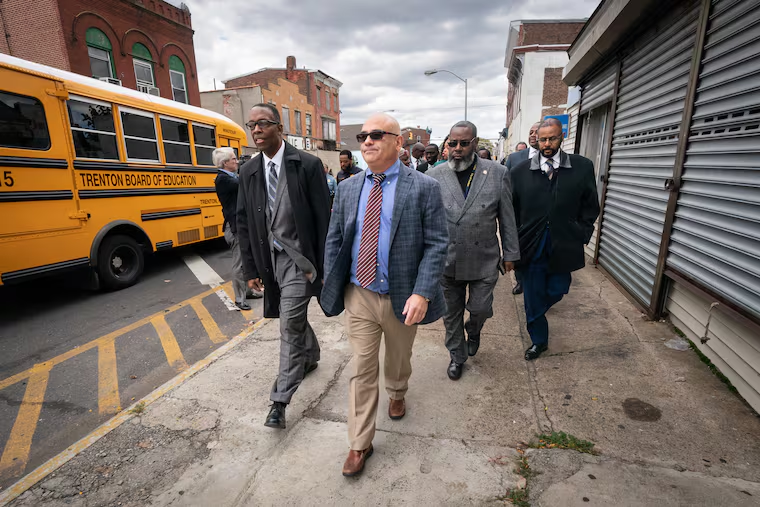To address gun violence, Philly leaders need to ‘figure out a way to like each other,’ Council president says
Six members of City Council traveled to Trenton, where there wasn't a single homicide all summer. What they learned about the city's strategy? "People need to work together."

Philadelphia City Council President Darrell L. Clarke said Wednesday that city and law enforcement leaders have not worked together to put the full weight of the government behind reducing gun violence and need to “get in a room and figure out a way to like each other.”
The leader of Philadelphia’s legislative arm didn’t name the targets of his critiques — but he didn’t have to. Last time Clarke called out a lack of collaboration among city officials, the day ended with Mayor Jim Kenney and District Attorney Larry Krasner taking swipes at each other.
“People need to work together and stop putting on a public face in front of the camera,” Clarke said during a news conference Wednesday. “We see municipalities all over starting to tick their [shootings] numbers down. We’re going in the other direction.”
Clarke’s comments were made inside a recreation center in Trenton, where a half-dozen members of City Council traveled to learn about the city’s gun violence reduction strategies. That city saw a record-breaking number of homicides in 2020 and 2021 — but a 62% decrease this year. Trenton didn’t have a single homicide for three months over the summer, and has recorded 16 homicides this year.
Philadelphia has not experienced a similar decline. Shootings spiked dramatically in 2020, and last year was the deadliest in recorded history, with 562 homicides. This year, homicides have been roughly on pace with 2021.
» READ MORE: Philly Police Dept. has inconsistent strategies, slow response times, and outdated systems, city controller says
The cities are clearly different. The population of Philadelphia is more than 15 times that of Trenton. Philadelphia’s Police Department has a nearly $800 million budget; Trenton’s is $32 million.
Still, officials in Trenton have seen crime declines after implementing a two-pronged response to gun violence that pairs a law enforcement strategy with other interventions like social services and blight reduction. Mayor Reed Gusciora said the key crime strategy is “to take all of our departments and focus on crime.”
“Our directors have really worked hard to really go beyond the scope of their departments,” Gusciora said, “and make sure that it all fits together like a puzzle and that, at the end of the day, public safety will be better for it.”
That’s similar to what Clarke and Co. saw less than a year ago when they orchestrated a similar meet-and-greet with officials in Chester, who said city leaders and law enforcement there work hand-in-hand to reduce gun violence.
That contrasted with Philadelphia, where top city leaders like Kenney and Krasner have in some cases openly disagreed about their respective roles.
Kenney’s and Krasner’s offices each pushed back on the notion that they don’t effectively work together. Kevin Lessard, a spokesperson for the mayor, said a priority of the administration’s response to gun violence “has been coordination and collaboration that happens at every level, from leadership to frontline staff.”
And Jane Roh, a spokesperson for the District Attorney’s Office, said Krasner “look[s] forward to continued collaboration with our partners in law enforcement and City Hall.”
She said the DA has long advocated for a two-pronged strategy like the one employed in Trenton, saying the office is working with City Hall to “address long-standing disinvestment and inequities that have been a weight upon Philadelphians’ hopes and potential for decades.”
» READ MORE: Following Roxborough shooting, Philly City Council members call for a more urgent response to gun violence
It’s still not clear what role Council plays in smoothing the relationships between elected officials and government bureaucrats. Clarke said Council is limited in what it can do “because we’re not in control of any of the workforce.”
He said the body worked with the administration last year to appropriate millions of dollars to fund antiviolence programs, including ones that aim to identify people most likely to shoot or be shot and engage them with city services.
And he said Council approved funding for security cameras at recreation centers that have yet to be installed. The administration has said the cameras have been delayed by supply-chain hiccups.
“We appropriated a whole bunch of money last time for the individuals that were going to be our street team, so to speak,” Clarke said. “We put in money for cameras in our recreation centers. ... Has it been implemented? No. Have the street teams made an impact? We don’t know yet. At the end of the day, it’s about implementation.”
At-large Councilmember Isaiah Thomas tried to project a unified front with his fellow Council members — and signaled there are ways the body can hold other officials accountable in the future.
“As a legislative body, we are a team,” he said. “And if we have to twist and pull a few arms to get people to be a part of the collaborative effort, sometimes that’s what we have to do.”